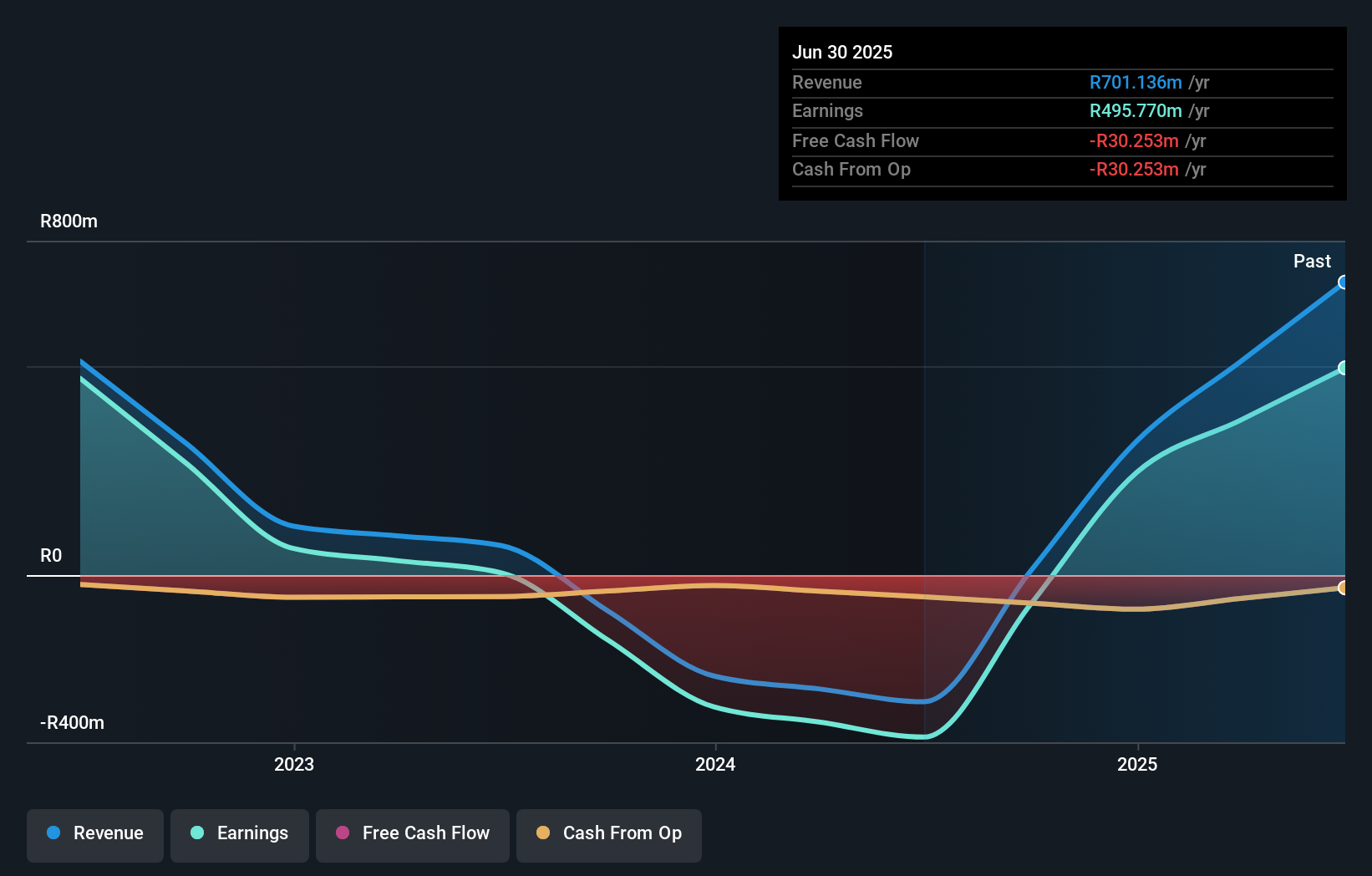- South Africa
- /
- Capital Markets
- /
- JSE:EPE
EPE Capital Partners Ltd's (JSE:EPE) market cap touched R2.1b last week, benefiting both retail investors who own 54% as well as institutions
Key Insights
- EPE Capital Partners' significant retail investors ownership suggests that the key decisions are influenced by shareholders from the larger public
- The top 25 shareholders own 46% of the company
- 42% of EPE Capital Partners is held by Institutions
To get a sense of who is truly in control of EPE Capital Partners Ltd (JSE:EPE), it is important to understand the ownership structure of the business. We can see that retail investors own the lion's share in the company with 54% ownership. That is, the group stands to benefit the most if the stock rises (or lose the most if there is a downturn).
Following a 16% increase in the stock price last week, retail investors profited the most, but institutions who own 42% stock also stood to gain from the increase.
Let's delve deeper into each type of owner of EPE Capital Partners, beginning with the chart below.
Check out our latest analysis for EPE Capital Partners

What Does The Institutional Ownership Tell Us About EPE Capital Partners?
Institutional investors commonly compare their own returns to the returns of a commonly followed index. So they generally do consider buying larger companies that are included in the relevant benchmark index.
We can see that EPE Capital Partners does have institutional investors; and they hold a good portion of the company's stock. This implies the analysts working for those institutions have looked at the stock and they like it. But just like anyone else, they could be wrong. When multiple institutions own a stock, there's always a risk that they are in a 'crowded trade'. When such a trade goes wrong, multiple parties may compete to sell stock fast. This risk is higher in a company without a history of growth. You can see EPE Capital Partners' historic earnings and revenue below, but keep in mind there's always more to the story.

Hedge funds don't have many shares in EPE Capital Partners. Consolidated Retirement Fund for Local Government is currently the largest shareholder, with 11% of shares outstanding. For context, the second largest shareholder holds about 6.3% of the shares outstanding, followed by an ownership of 5.8% by the third-largest shareholder.
On studying our ownership data, we found that 25 of the top shareholders collectively own less than 50% of the share register, implying that no single individual has a majority interest.
Researching institutional ownership is a good way to gauge and filter a stock's expected performance. The same can be achieved by studying analyst sentiments. Our information suggests that there isn't any analyst coverage of the stock, so it is probably little known.
Insider Ownership Of EPE Capital Partners
While the precise definition of an insider can be subjective, almost everyone considers board members to be insiders. Company management run the business, but the CEO will answer to the board, even if he or she is a member of it.
Most consider insider ownership a positive because it can indicate the board is well aligned with other shareholders. However, on some occasions too much power is concentrated within this group.
Shareholders would probably be interested to learn that insiders own shares in EPE Capital Partners Ltd. It has a market capitalization of just R2.1b, and insiders have R72m worth of shares, in their own names. Some would say this shows alignment of interests between shareholders and the board, though we generally prefer to see bigger insider holdings. But it might be worth checking if those insiders have been selling.
General Public Ownership
The general public -- including retail investors -- own 54% of EPE Capital Partners. This level of ownership gives investors from the wider public some power to sway key policy decisions such as board composition, executive compensation, and the dividend payout ratio.
Next Steps:
While it is well worth considering the different groups that own a company, there are other factors that are even more important. Take risks for example - EPE Capital Partners has 1 warning sign we think you should be aware of.
Of course this may not be the best stock to buy. Therefore, you may wish to see our free collection of interesting prospects boasting favorable financials.
NB: Figures in this article are calculated using data from the last twelve months, which refer to the 12-month period ending on the last date of the month the financial statement is dated. This may not be consistent with full year annual report figures.
Valuation is complex, but we're here to simplify it.
Discover if EPE Capital Partners might be undervalued or overvalued with our detailed analysis, featuring fair value estimates, potential risks, dividends, insider trades, and its financial condition.
Access Free AnalysisHave feedback on this article? Concerned about the content? Get in touch with us directly. Alternatively, email editorial-team (at) simplywallst.com.
This article by Simply Wall St is general in nature. We provide commentary based on historical data and analyst forecasts only using an unbiased methodology and our articles are not intended to be financial advice. It does not constitute a recommendation to buy or sell any stock, and does not take account of your objectives, or your financial situation. We aim to bring you long-term focused analysis driven by fundamental data. Note that our analysis may not factor in the latest price-sensitive company announcements or qualitative material. Simply Wall St has no position in any stocks mentioned.
About JSE:EPE
EPE Capital Partners
An investment holding company, invests in a portfolio of unlisted private equity-type investments in South Africa, rest of Sub-Saharan Africa, and internationally.
Acceptable track record with mediocre balance sheet.
Market Insights
Community Narratives



